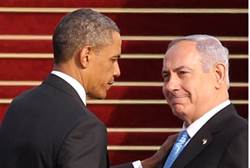 WASHINGTON � As the Obama administration embarks on a highly visible diplomatic overture to Iran, White House officials are engaged in a quieter, behind-the-scenes effort to reassure Israel that they will not fall for the charms of Iran�s new president by prematurely easing pressure on his government to curb its nuclear program.
WASHINGTON � As the Obama administration embarks on a highly visible diplomatic overture to Iran, White House officials are engaged in a quieter, behind-the-scenes effort to reassure Israel that they will not fall for the charms of Iran�s new president by prematurely easing pressure on his government to curb its nuclear program.Prime Minister Benjamin Netanyahu of Israel arriving for a cabinet meeting in Jerusalem on Tuesday. His office dismissed Iranian suggestions of openness to diplomacy as �media spin.�
In private conversations with Israeli officials and a few public statements, administration officials have emphasized that they remain skeptical of Iran�s intentions on the nuclear program, and that they will judge Iran by its actions, not by the conciliatory words of its newly elected president, Hassan Rouhani. In advance of his arrival in New York next week for a meeting of the United Nations General Assembly, Mr. Rouhani has signaled a willingness to negotiate an agreement over the future of Iran�s nuclear program.
But the White House�s reassurances did not prevent Prime Minister Benjamin Netanyahu of Israel from issuing a harsh condemnation of Mr. Rouhani this week, presaging a potential showdown with President Obama over how to deal with Iran, after a period in which the two leaders appeared finally to be in sync.
Amid news of an�exchange of letters�between Mr. Obama and Mr. Rouhani, and fresh discussion in Washington of negotiations that could lift sanctions against Iran, Mr. Netanyahu�s office dismissed as �media spin� a raft of statements by Mr. Rouhani about the peaceful goals of Iran�s nuclear program and his willingness to engage in diplomacy.
�There is no need to be fooled by the words,� said a lengthy Israeli statement issued late Thursday in response to�Mr. Rouhani�s NBC News interview. �The test is not in what Rouhani says, but in the deeds of the Iranian regime, which continues to advance its nuclear program with vigor while Rouhani is being interviewed.�
Mr. Netanyahu, who has described Mr. Rouhani as a �wolf in sheep�s clothing,� has stepped up his longstanding campaign against Iranian nuclear development in recent days, and plans to make it the focus of a meeting with Mr. Obama in Washington on Sept. 30 and a speech to the General Assembly the next day.
While American officials have repeatedly told their Israeli counterparts that they would be cautious in their dealings with the Iranian president, the White House has also made clear that it has an obligation to test whether Mr. Rouhani�s expressions of interest in diplomacy are genuine.
�We certainly recognize and appreciate Israel�s significant concerns about Iran, given the threats that have been made against Israel and the outrageous comments that have come out of Iran for many years about Israel,� Benjamin J. Rhodes, a deputy national security adviser, told reporters on Friday, previewing the message that Mr. Obama will deliver to the United Nations next Tuesday, a week earlier than Mr. Netanyahu.
�There�s not an open-ended window for diplomacy,� Mr. Rhodes said. �But we do believe there is time and space for diplomacy.�
Washington and Jerusalem both want to keep Iran from obtaining a nuclear weapon, but have often disagreed on the timetable and strategy for doing so. Israel, which sees a nuclear Iran as a dire threat to its existence, has pressed for a more forceful military threat. The United States, while stressing that all options are on the table, has urged Israel to give diplomacy and sanctions more time.
Mr. Rouhani�s election has clearly intrigued the White House. Senior officials said that unlike his predecessor, Mahmoud Ahmadinejad, he seemed to have the authority from Iran�s supreme leader, Ayatollah Ali Khamenei, to negotiate on the nuclear issue. He also has a broad political mandate in Iran, officials said.
�It�s certainly different perspectives looking at the same picture,� said Dore Gold, president of the Jerusalem Center for Public Affairs and a former Netanyahu aide. �Israel is clearly focused on Iranian action, and the messages in Washington seem more hopeful about Iranian intentions.�
Since Mr. Netanyahu�s United Nations speech last year laying out his red lines on Iran, and especially since Mr. Obama�s visit to Israel in March, the two countries have seemed in alignment. But many Israeli leaders and analysts saw Mr. Obama�s zigzag response to Syria�s use of chemical weapons as a bad omen for his resolve in stopping Iran.
�Netanyahu�s words were most likely meant for the ears of the members of Congress, so they will not let Obama get carried away by Rouhani�s overtures,� Ron Ben-Yishai, a journalist, wrote in an analysis published on Ynet, an Israeli news site. �The Israelis are also telling their American counterparts that just like in the case of the Syrian crisis, a credible military threat is needed in order to get results on the diplomatic track.�
By The New York Times
The Iran Project is not responsible for the content of quoted articles.










